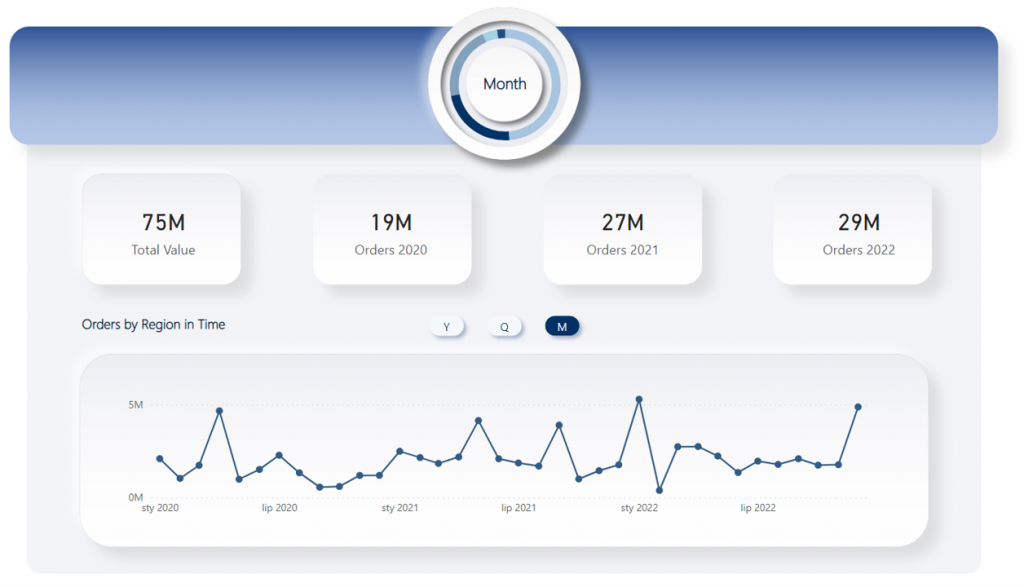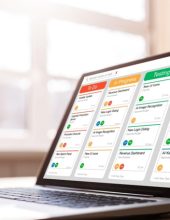Many managers from Sii and other IT companies have a quick journey or even serious developing or programming experience. After years of work related to programming or testing, they often decide to prove themselves in business and… many times succeed since solid operational knowledge allows them to feel more at ease in conversations with the customer and when running projects. But is it possible and worthwhile to do exactly the opposite – to go from “Business” to “Development” ? The answer is – YES! My story is an interesting example of this…
Step 1. Shocker
I have worked in the business for a long time and in various departments such as Sales, Marketing and Logistics. In addition, I have experience in many fields and markets. I have brought this experience from some of the largest companies in the world:
- Cola Cola,
- Mars,
- L’Oreal,
- American Express.
Because of that, no business topic in the conversations with customers or partners has ever been unfamiliar to me. Up to now. When I came to Sii to work in a typical sales position BDM (Business Development Manager) in Competency Center Data&Analytics, I thought I would feel like a duck to water. However, in my first meetings with customers, I saw for the first time that I was unable to contribute anything to the discussion – I understood practically nothing. When talking about data warehouses, ETLs or OLAP cubes, I didn’t have a chance to make sense of it. When writing projects proposals for customers, whose success I was in some way responsible, I could only improve grammar and spelling. It was the only contribution to a project that has any sense. One day, during the all-day meeting at the customer’s site, I opened my mouth only during pizza break, talking only about skiing – that was my whole contribution to the discussion about data warehouses.
Step 2. Frustration
Of course, I didn’t give up at all and I didn‘t give up the hope I had in becoming familiar with the nomenclature and a casual understanding of the situation. Unfortunately, the listening experience only, gives practically nothing in the real assessment of the situation and when making decisions on whether a given bid should be priced at 50 or 150 MD (man-day, meaning a day’s work for one person). In such a situation you always have to take a “technical person” to the meeting with you and fully rely on their judgment – without being able to verify whether it’s correct or not.
The entire effort in offers construction was still focused on the “foreword”. A realistic assessment of the merits was absolutely out of reach, even with a “listening experience” and general understanding of what Data Lake is and how SSIS differs from SSAS. After more than a year of such “general listening” to the topic, I knew that it was a road to nowhere and the problem would not solve itself no matter how much time passed. My assessment of the situation was quite clear – such a passive attitude makes no sense.
Step 3. Epiphany
Since nothing will happen on its own, I was thinking about the solutions like changing my job or position. Nevertheless, I wanted to work in IT and I realized that in this sector sooner or later lack of technical knowledge will be a major barrier to professional development.
Of course, in the sales positions connected with “staffing” no merits is especially needed. Here this “listening experience “ is enough. However, when it comes to IT projects, Analysis and management of data included, „business people” will always have to rely on „technical people”, who determine the success or failure of a particular project. Obviously, the business can always mess up or fix a lot in the project.
However – no project can be done without a „technical person” but without a „business one” absolutely yes. In conclusion, getting away from merits was not an option in the long run. There was only one way out – a clear and specific although hard goal: gain real technical knowledge yourself! Great idea but with quite a demanding job and housework connected with 3 kids, sports and trips, its realization seemed to be out of reach.
Step 4. First Plan
I decided to act because I had no particular choice, yet seeing a clear and attractive target on the horizon. I based the method of gaining technical knowledge on a motto from the wall of my gym. It sounded more or less like this: “A day has 24 hours, so you will find 45 minutes for training for sure”. In addition, if you count that over the year you can have 365 such lessons, it already comes up to quite a bit. So, it seems that at least the basics of knowledge in the area of Data Analytics lie at hand.
Armed with such a well-thought-out plan, I took to the most popular reporting tool, Power BI. I decided that I would learn from cover to cover the tutorial offered by Microsoft and be beyond the fold.
Step 5. Reality
As I said, so I did. Every morning before work or when the kids went to bed, I caught an average of 45 minutes of online education. I listened, did exercises and did homework. Then I did some practice with the first graphs myself in Power BI. Indeed – after half a year of listening to lectures and making notes, I concluded that I probably already knew something about Power BI. My first charts were complex and colorful – no pie charts or column diagrams were a problem, and I made tables and maps on cue. So I decided it was high time to test myself and see how I would fare when confronted with reality.
Without telling anyone (fortunately!) I enrolled for an exam from Power BI and went with an optimistic attitude. Unfortunately, the reality has proven to be quite different from expectations. I didn’t pass this exam, and what is more, most of the questions didn’t relate at all to the scope I had covered during the course. Not a single question about charts or visualization of any kind. Mostly it was all about DAX, the coding language used in Power BI, access management and how to extract and transform data.
I realized two things:
- The knowledge regarding Power BI has nothing in common with visualizations, which are only the tip of the iceberg.
- You cannot replace solid practical knowledge with theory from courses.
At this point I found myself on a scientific curve and up against the wall – I realized that another change in approach would be needed. Without going deep into DAX and into the practice of Power BI, I will go no further.
Step 6. Practice makes perfect
I decided I will work and realistically implement production projects and it will be the best form of gaining real knowledge about Data Analysis. The kids have grown up, started to be more independent and have already gone to kindergarten, so there was more time for extra work.
I managed to get all the approvals to first do an unpaid part-time internship with one of our customers for several months (later the internship transitioned smoothly into a standard contract). So the ¼-time work began, that is, real project work for our customer with all its attributes like “daily”, “weekly”, “sprints” and deadlines. It wasn’t easy, as every weekend was a working one, and returns from the office after 8 pm became standard.
Fortunately, I managed to survive and run after two hares at the same time. An important note here – none of this would have worked if it weren’t for colleagues with developer experience who helped me through the storm and the strain. The support of Kuba Burzyk, who helped me solve Power BI cases and gave me tips on what to do and how to do it, was priceless – in the beginning, despite my willingness, I wouldn’t have done much on my own.
Step 7. It finally clicked
After some time, I started to gain practical knowledge which helped me work a little bit more on my own. What is more, I felt strong enough to go and pass the Power BI exam the second time and this time it went smoothly with a really good result – I passed with a fair advantage and was able to show off to everyone. The happiness and joy were endless. Now I was able to contribute to Power BI projects myself, and at the same time, I decided to follow suit and take on other areas of expertise, i.e. SQL, data warehousing, ETLs.
Going beyond Power BI was a natural course of events. The next exam, this time in Azure Data, went well. I passed it on the first try, which boosted my confidence, strengthened my self-reliance, and facilitated my understanding of the entire spectrum of the data area. I was able to handle myself to the point where I could help less experienced colleagues and offer solutions to customers without the support of others.
Step 8. Level Ekspert
In the next projects, I could work on my own in and out of Power BI, performing simpler tasks in the area of ETL or Data Warehouse. I was providing sales and marketing trainings before so I decided to transfer this experience to the newly mastered area.
I have been providing training in Power BI and visualization techniques for some time now. While it used to be only basic and intermediate levels, my portfolio now includes advanced training courses
- Power BI – DAX,
- Power Query,
- Visualization techniques.
Interestingly and surprisingly: you can learn a lot from your own trainings!
- To teach others, you need to systematize and organize the knowledge you have.
- During practical trainings, and these are the only ones I offer to my students, there are always some new situations that you have to deal with somehow “live”. The audience’s quick error correction and non-obvious questions improve and battle-harden each speaker’s knowledge.
Having so many years of experience in the technical area of BI , I want to go completely on the development path and pre-sales support in the Sii Data & Analytics Competence Center in the ad-hoc form.
Conclusion
If anyone would like to answer the question of whether such a path is also right for them, I have good advice here. It’s useful to answer the questions for yourself:
- Do I like learning new things and gaining further skills?
- Do I want to develop?
- Am I comfortable here where I am?
If we don’t have the time or willingness to wade through the thicket of IT knowledge with Asian persistence, it’s better to let it go.
Of course, while working in sales, we can still learn something but generally after gaining a couple of years’ experience and undergoing basic trainings this build-up of additional knowledge is rather marginal. We build on what we already know and draw on our intuition and experience.
Being on the development side, it is quite different, especially in the data area. Here, a constant revolution is going on with the migration to the cloud, new tools and opportunities from Big Data or Machine Learning. And learning is very often done outside of work, so sleepless weekends or evenings can be a daily occurrence – I recommend consulting and securing family support before making a decision.
Continuous acquisition of hard knowledge of new tools and solutions, very often completed by exams, is essential. You have to keep growing and learning, which can be both a disadvantage for some and a huge advantage for others. I recommend it’s best to see for yourself 😉
If you want to try your hand at Power BI, for example, there is one excellent piece of news – there is no risk involved. Practically everything is free. The reporting tool, Power BI Desktop, along with cloud space for private publishing, is free. In addition, YouTube is full of great quality trainings on every aspect of Power BI, even the very detailed ones. At the end of the article, helpful links for those interested.
For those who may someday decide to start studying, I wish you a greeeat deal of perseverance and good luck! From my point of view, I assure you that it is worth it 😊
Selected courses and tools
- Power BI Desktop – narzędzie do tworzenia raportów Power BI do pobrania ze strony Microsoftu
- Centrum Szkoleniowe Microsoft – wprowadzenie i opis nt. Power BI dla początkujących
- Przykładowy dobrej jakości kurs na YT dla początkujących
***
If you are interested in other roles that can be played in IT, be sure to check out the articles about the career path of our experts, including: Kierownik Projektów IT, od Programisty do Product Ownera, Inżynier Wydajności, Analityk IT, Resource Manager i Team Leader.

















Leave a comment